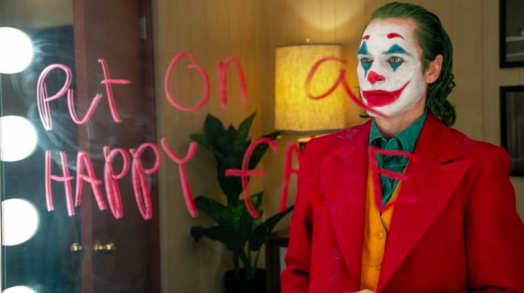By Connor Mirabella || Staff Writer

Photo courtesy of collider.com.
“My mother always tells me to smile and put on a happy face. She told me I had a purpose: to bring laughter and joy to the world.” Not exactly the words you expect to hear from DC’s most famous villain in a career defining performance by Joaquin Phoenix. Todd Philips’ Joker may not bring you laughter, but it will leave you yearning for more. Given the mysterious and uninformative nature of the previews, it’s difficult to know what to expect walking into the theater. This was done deliberately and spectacularly; every moment of the film is engaging. Love it or hate it, this movie was engaging from start to finish and reveals how truly broken our system of dealing with mental health patients is. Initially a skeptic, I have always been a big believer in Heath Ledger’s rendition of the joker. No other version of this character has ever come close to Ledger’s in quality or originality – until now.
Arthur Fleck is a man who likes to make people laugh and smile (which is why he works as a clown), but he is also downtrodden and lacks connections and purpose. At one point he tells his government assigned therapist that “through my whole life, I didn’t even know if I really existed.” This film has been criticized by some for being cynical and making audiences uncomfortable, but that is a critical element of this work of art. The realism is so well played out that one leaves the theater wondering who around them could be the next joker. One of the best ways to describe Arthur Fleck during the majority of this film is as a person that nobody cares about. Not a person who is hated, but somebody who is not loved and may have never been. The character unravels throughout the film in such a way that leads viewers to root for Fleck in achieving any form of confidence and satisfaction in an exceedingly cruel world.
Phoenix’s ability to delve into the role physically added a crucial aspect to the performance. The body movements communicate more than just the importance of the scene but also the position Arthur Fleck is in, typically lacking power, influence, and importance. Joaquin Phoenix had to meet with a nutritionist to achieve the desired slender build and ate close to 500 calories a day for much of the filming. The awkward body stance of Arthur Fleck further reflects his misshapen mind and crumpled sense of self. When he is alone, there’s a visible freedom in his movements as he dances in the mirror. When he’s in his clown makeup? Perfectly controlled body movements reveal coordination and confidence. But in every other scene, Arthur Fleck moves around like he’s never quite sure how to use his limbs; where to stand, walk, sit, or be. He sods around a Gotham that feels like it could be New York City in the 1970’s and falls almost entirely outside of the DC Universe. The personal decomposition of a mentally ilI man that has been in the shadows of society all his life is more than just an explanation of why the joker exists, but a possible explanation for why senseless evil exists in this world at all. “What do you get when you cross a mentally ill loner with a society who abandons him and treats him like crap? — What you deserve.”
Junior Connor Mirabella is a Staff Writer. His email is jmirabel@fandm.edu.